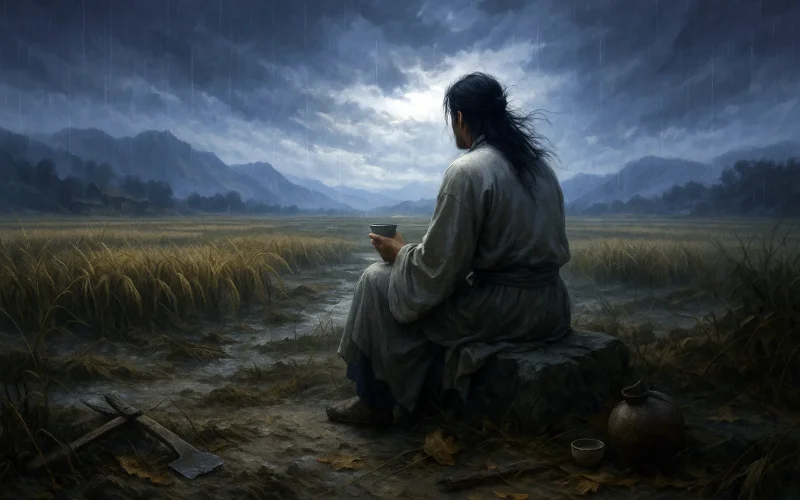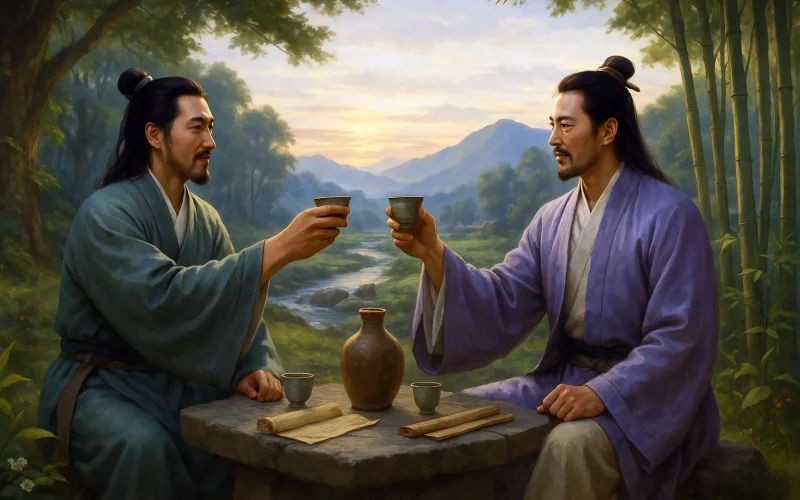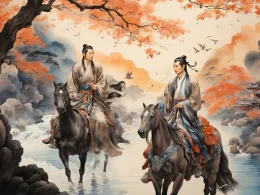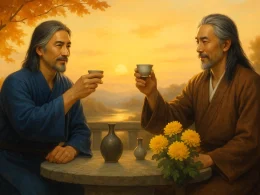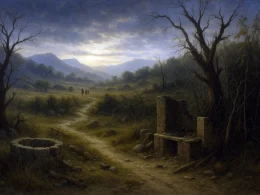The way to Heaven’s dim and far,
Who knows what gods and spirits are.
At fifteen I learned to do good,
At fifty-four I passed manhood.
While young, I went a rugged way;
My lute-string broke before its day.
The burning sun scorched my fields;
The insects damaged my corn yields.
The wind and rain raged up and down;
I could not reap half I have sown.
Hunger stared me at summer’s height;
Cold bed freezed me in winter night.
At dusk I waited for cocks to crow,
At dawn for the sun to sink low.
Not Heaven but I am to blame;
What e’er I do, I’m still the same.
What matters the fame after death?
It will vanish like smoke or breath.
Alone I pour out plaintive song.
Will connoisseurs listen for long?
Original Poem
「怨诗楚调示庞主簿邓治中」
陶渊明
天道幽且远,鬼神茫昧然。
结髮念善事,黾勉六九年。
弱冠逢世阻,始室丧其偏。
炎火屡焚如,螟蜮恣中田。
风雨纵横至,收敛不盈廛。
夏日长抱饥,寒夜无被眠;
造夕思鸡鸣,及晨愿乌迁。
在己何怨天,离忧凄目前。
吁嗟身后名,于我若浮烟。
慷慨独悲歌,钟期信为贤。
Interpretation
Composed around 420 CE during Tao Yuanming's destitute later years, this poem emerges from profound personal crises - the poet in his fifties having endured national turmoil, family loss, home destruction, and dire poverty. While maintaining his refusal to serve corrupt powers, his early optimism yields to deep questioning of fate, society, and so-called "cosmic justice." This Chu-style work articulates his indignation, doubt, lamentation and unbroken spirit through verses addressed to understanding friends Pang and Deng.
First Couplet: "天道幽且远,鬼神茫昧然。结髮念善事,黾勉六九年。"
Tiāndào yōu qiě yuǎn, guǐshén mángmèi rán. Jié fà niàn shàn shì, mǐnmiǎn liùjiǔ nián.
"Cosmic principles lie dark and remote, Spirits and ghosts vague beyond note. Since youth committed to virtuous deed, Sixty years striving without concede."
The opening challenges traditional beliefs in divine justice, introducing the poet's lifelong moral consistency despite mounting adversities.
Second Couplet: "弱冠逢世阻,始室丧其偏。炎火屡焚如,螟蜮恣中田。"
Ruòguàn féng shì zǔ, shǐ shì sàng qí piān. Yánhuǒ lǚ fén rú, míngyù zì zhōngtián.
"At twenty met with world's cruel tide, At thirty lost my partner by side. Fiery blazes consumed my home, Vermin ran wild through crops' loam."
Specific calamities accumulate - political chaos, personal bereavement, natural disasters - forming an indictment against any notion of karmic justice.
Third Couplet: "风雨纵横至,收敛不盈廛。"
Fēngyǔ zònghéng zhì, shōuliǎn bù yíng chán.
"Winds and rains came raging wild, Harvests couldn't fill one granary's aisle."
Nature's relentless assaults culminate in complete agricultural failure, the poet's livelihood devastated.
Fourth Couplet: "夏日长抱饥,寒夜无被眠;造夕思鸡鸣,及晨愿乌迁。"
Xiàrì zhǎng bào jī, hán yè wú bèi mián; zào xī sī jī míng, jí chén yuàn wū qiān.
"Summer days enduring hunger's pain, Winter nights without quilt against cold's bane. Dusk falls - I long for cockcrow's cry, Dawn comes - I beg the crow to fly."
Physical suffering becomes temporal torture, each moment of discomfort stretching endlessly.
Fifth Couplet: "在己何怨天,离忧凄目前。吁嗟身后名,于我若浮烟。"
Zài jǐ hé yuàn tiān, lí yōu qī mùqián. Xūjiē shēnhòu míng, yú wǒ ruò fú yān.
"Why blame heaven when faults are mine? Present sorrows make life decline. Alas! Posthumous fame they prize, To me like drifting smoke it lies."
The turning point - rejecting self-pity while dismissing conventional Confucian immortality through reputation.
Sixth Couplet: "慷慨独悲歌,钟期信为贤。"
Kāngkǎi dú bēigē, Zhōng Qī xìn wéi xián.
"Alone I sing this resolute woe, Zhong Qi-like friends make worth bestow."
The resolution - maintaining dignity through self-expression and spiritual kinship with understanding friends.
Overall Appreciation
This poem condenses Tao Yuanming's late-life philosophy through stark autobiographical narrative. The first fourteen lines catalog a life of virtuous perseverance met with unrelenting misfortune, systematically deconstructing traditional beliefs in moral retribution. His declaration of cosmic principles as "dark and remote" constitutes radical skepticism toward medieval Chinese theodicy. The concluding six lines reveal his existential resolution - rejecting worldly rewards while affirming inner fortitude and the redemptive power of true friendship.
Writing Characteristics
- Unadorned Language, Profound Resonance: Tao's signature "unembellished yet meaningful" style makes each plainspoken detail reverberate with accumulated suffering.
- Architectonic Progression: Moves from abstract propositions → concrete sufferings → philosophical resolution → spiritual consolation.
- Transformation Through Anguish: The emotional trajectory from despair to hard-won serenity models the Confucian ideal of "cultivating oneself when impoverished."
Insights
Tao's poem demonstrates how integrity can transform suffering into spiritual triumph. His "rather starve than bend for official rice" stance represents the pinnacle of Chinese literati ethos. The work teaches that true dignity arises not from external validation but internal constancy, while acknowledging how spiritual kinship mitigates life's harshness. This medieval testament continues to illuminate modern struggles with injustice, meaning, and human resilience.
Poem translator
Xu Yuan-chong (许渊冲)
About the poet

Tao Yuanming(陶渊明), 365–427 CE, was a poet, literary figure, fu writer, and essayist active during the late Eastern Jin and early Liu Song dynasties. Born in Chaisang (near present-day Jiujiang, Jiangxi Province), he pioneered a new genre of pastoral-themed literature, expressing profound philosophical insights through simple language. His poetic style became an enduring aesthetic standard in classical Chinese poetry.





